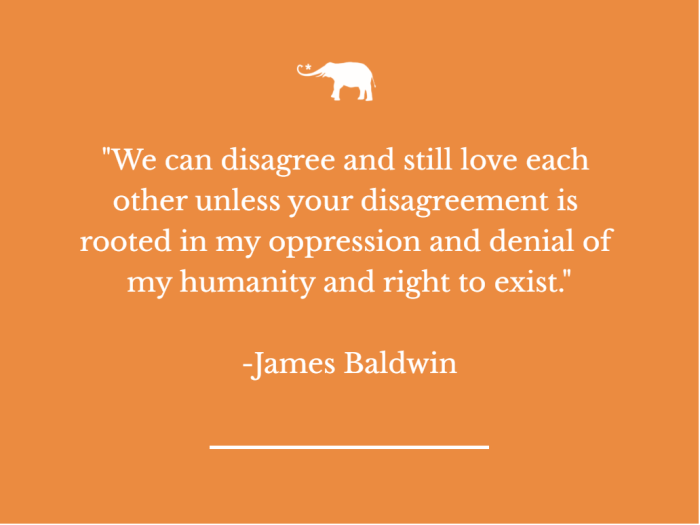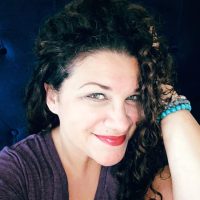For starters. I’m white. That is to say I am not of African American, Latino, nor Islander decent.
My late father’s heritage traces back to the islands of southern Italy and Sicily, and my mother continues to permeate our strong Dublin blood, both in disposition and grace. For all intent and purposes, I’m a white girl. Except, growing up that wasn’t the racial grouping I identified with, as society had its own way of shaping how I would identify with race, skin color, equality, and acceptance.
Perhaps, it’s the way my olive skin turns a bourbon smoked tan during the summer months, filled with oil-glazed pool days and saltwater kissed beach memories, mixed with my hazel eyes and head crowned in kinked cascading curls that makes people assume I’m from the islands of Puerto Rico. Or, maybe it’s the flat, slightly widened button nose I inherited from my grandmother that makes people think I’m a biracial mix of white and African American. Whatever it is? I have never been made to feel white. In fact, my entire life I have been made to feel anything but.
My older brother, once in a while, shares the story of how when we were kids, one of his friends came over to the house and after seeing me, turned to him and said, “I didn’t know you had a black sister!” My parents divorced when I was around eight or nine years old, and summers were spent with my dad which oftentimes meant long bike rides to the community pool for a built-in babysitter for my older brother. That was the first time I remember feeling not white. Brushed off as an afterthought, it wasn’t until my mom moved us to this tiny town of not quite 2,000 people fenced in by cornfields and small minds did I feel racial inequality for the first time.
Walking high school hallways in a sea filled with mermaid blonde hair flips and wrangler jean cowboy boot clicks with silent stares will have you breathing in a way that makes you feel small, visibly invisible, and completely alien. I didn’t belong and everyone made damn certain to make that clear. Nobody talked to me that first day of school. In a blink, I went from a high school where I had high school “normal” problems to feeling utterly non-existent. I remember going home, crying, screaming, pissed off at my mother for moving us. The anger I felt for being so incredibly and harshly judged—and for what?
I later found out, with my sister being a year younger than me, that everyone assumed I was black. And in an all-white high school, I was apparently very much an alien. I don’t think I will ever be able to put into words the injustice, the ridiculousness, and the anger I felt for feeling unworthy to be included just because of the color of my skin—which was perceived to be that which I was not in the first place, and that really pissed me off, because that in and of itself was just wrong. It was in that moment that I used my white privilege in an attempt for social change because well, I knew I was white, regardless of what everyone else thought.
That fire for justice and equality led me to tryouts for the varsity cheerleading team. There were six spots and the same six girls tried out, the same six girls who cheered together all throughout middle school and high school. Until I showed up. I was the seventh girl who tried out that year. Needless to say, I was the sixth girl who made the varsity cheerleading team.
Then, I auditioned for the high school musical, Grease. There was a role everyone knew this girl was after—and so I went after it as well. I played a damn good Jan in that musical. Needless to say, I wasn’t popular nor well liked, but the racial injustice and inequalities slowly shifted those two years in that small little cornfield town in the Midwest of Illinois.
This I am white, hear me roar rebellious social change streak in me continued well into college. I was the only non-black member of my university’s Multicultural Club, the majority of my closest friends were a spread of monochromatic browns, and one day during lunch in the campus café, one of my friends turned to me and asked, “Erin, what are you?” To which I sarcastically replied, “Well, last time I checked I do believe I’m a girl.” With that snapped “tsk” sound of her mouth and eye roll, she retorted, “Girl, you know what I mean! Like, what’s your race, your nationality? Like are you mixed, cause you look black.”
“I’m whatever you want me to be that makes you want to be my friend. Because I’m just me,” I continued, “But my dad is Italian/Sicilian and my mom is Irish—so I guess you could say I’m a white girl,” I shrugged.
“Damn,” she replied. “I’ve never kicked it with a white girl. You’re cool people.”
Today, more than 20 years later, as I hear my biracial twin boys tell me stories of overhearing a teacher say, “I already have enough black kids in my class, I don’t need anymore,” or how a teacher went out of her way to contact a parent when not hearing back from them about chorus being cancelled but didn’t do the same for our biracial family; when I hear my son tell me, “He is my best friend mom because he’s nice to me and he’s the only darkest skinned kid in my class and someone needs to be his friend,” it saddens me to think how not much has changed. The Black Lives Matter movement does matter, it is significant, paramount, and absolutely necessary because white privilege is still very much a problem.
And so, with fists raised high, I say to my sons, “Keep fighting the good fight. Keep using your white privilege to help influence and make change happen.” Because it takes even our white privilege to show through actions that black belongs—black belongs everywhere.












Read 2 comments and reply